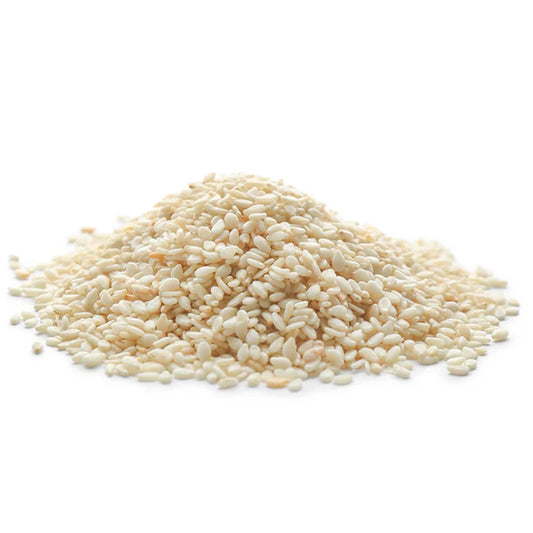

About Sesame Seeds
Add some crunch to your favorite dishes with our Sesame Seeds. Bursting with calcium, magnesium, and iron, Sesame Seeds are loaded with protein and micronutrients, making them a vegan-friendly alternative to adding to your savory vegetable dishes.
Do you SEED what we see?
Not only rife with protein, but our Sesame Seeds are loaded with dietary fiber, aiding in healthy digestion. Add our Sesame Seeds to your favorite stir fry or a fresh salad for an instant nutritional boost.
Benefits Of Sesame Seeds
-
Sesame seeds are rich in essential nutrients like calcium, magnesium, iron, zinc, and vitamin E, providing a nutritional boost to your diet.
-
They contain heart-healthy fats, including omega-6 fatty acids, which can help lower bad cholesterol levels and support cardiovascular health.
-
With their high calcium content, sesame seeds contribute to strong and healthy bones, promoting overall bone health.
-
Sesame seeds are packed with antioxidants that fight oxidative stress and inflammation, protecting cells from damage and supporting overall well-being.
-
The fiber in sesame seeds aids in digestion, promoting regular bowel movements and supporting digestive health.
-
Versatile in culinary use, sesame seeds add a delightful nutty flavor and crunchy texture to various dishes, from salads and stir-fries to baked goods and homemade sauces.
Uses Of Sesame Seeds
Delightful in Baking: Elevate your baking adventures by incorporating sesame seeds into bread, muffins, cookies, and cakes. Their nutty flavor and delicate crunch add a delightful twist to your favorite treats.
Crunchy Salad Toppers: Transform ordinary salads into culinary masterpieces by sprinkling sesame seeds on top. Their texture and flavor complement fresh greens, vegetables, and fruits, adding a satisfying crunch and nutty taste.
Asian-inspired Stir-fries: Infuse your stir-fries with authentic Asian flavors by incorporating sesame seeds into your favorite recipes. Toasted sesame seeds add depth and complexity to vegetable stir-fries, tofu dishes, and noodle bowls.
Savory Seasoning: Blend sesame seeds with herbs and spices to create your signature seasoning mix. Sprinkle it over roasted vegetables, grilled meats, or cooked grains for an extra layer of flavor and visual appeal.
Nutritious Smoothie Boost: Elevate your morning smoothie routine by adding a tablespoon of sesame seeds. Packed with essential nutrients, they provide a nutritious boost to your favorite fruit and vegetable blends.
Homemade Tahini: Unlock the magic of homemade tahini by blending toasted sesame seeds into a smooth and creamy paste. Use it as a base for savory sauces, dips, and dressings, or as a spread on toast or crackers.
FAQ
Q: What are sesame seeds?
A: Sesame seeds are tiny oil-rich seeds derived from the sesame plant (Sesamum indicum). They come in various colors, including white, black, and brown, and are widely used in cooking and baking.
Q: What are the health benefits of sesame seeds?
A: Sesame seeds are packed with nutrients like protein, fiber, vitamins, minerals, and antioxidants. They promote heart health, support bone health, aid digestion, and may even help lower cholesterol levels.
Q: How can I incorporate sesame seeds into my diet?
A: Sesame seeds can be used in a variety of ways in the kitchen. Sprinkle them on salads, stir-fries, and soups, or use them as a crunchy coating for chicken or fish. They're also delicious when added to baked goods like bread, cookies, and muffins.
Q: Are sesame seeds suitable for people with allergies?
A; Sesame seed allergies are becoming more common and can cause severe reactions in some individuals. If you have a sesame allergy, it's essential to avoid foods containing sesame seeds and check ingredient labels carefully.
Q: Can sesame seeds be used to make tahini?
A: Yes! Tahini, a creamy paste made from ground sesame seeds, is a staple in Middle Eastern cuisine. It's often used as a base for sauces, dips, and dressings, or as a spread on toast or crackers.
Q: Are sesame seeds easy to store?
A: To maintain their freshness and flavor, store sesame seeds in an airtight container in a cool, dark place, such as a pantry or cupboard. They can also be stored in the refrigerator or freezer for extended shelf life.
Recently Viewed
People Also Bought
Here’s some of our most similar products people are buying. Click to discover trending style.

